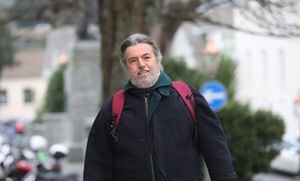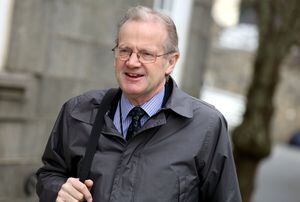'Education is going to take no lessons in integrity from people who set up a dishonest and unethical guerrilla marketing campaign' – statement in full
THE Committee for Education, Sport & Culture released this statement last night about the much-criticised appointment of a Head of Curriculum and Standards:

‘RECENT leaks of partial information and some half-truths and inaccuracies spoken by a couple of deputies as if they were facts have presented a wholly misleading picture about the actions of the Committee for Education, Sport & Culture in employment matters.
Legal advice provided to the Committee in good faith has been not to comment publicly or at least to comment as little as possible. Far from happily hiding behind such advice, the Committee, in the knowledge it has acted with good intent and integrity, would far rather openly set out the full sequence of events which led to the appointment of the Head of Curriculum and Standards.
However, no Committee of the States should disregard the obligations of the States as an employer. Committees have to respect that employment matters require at least some discretion and confidentiality.
The Committee now finds itself accused of wrongdoing, including by two members of the previous Committee. The Committee cannot allow these accusations to go unchallenged because they are serious and false.
In March this year interviews were held for a permanent Director of Education. Two of the applicants were Laurie Baker and Clare Sealy.
The interview panel contained two members of the Committee, two senior civil servants, including one unconnected to the Committee, and two educationalists external to the States.
The interview panel recommended to the Committee that Ms Baker should be appointed as Director of Education and the panel also unanimously recommended that the opportunity should not be lost to recruit Ms Sealy to a role specialising in her areas of expertise, including curriculum, standards and learning.
Subsequently, the Committee and senior civil servants agreed that every effort should be made to recruit Ms Sealy to such a role as part of a restructure of the Office of the Committee for Education, Sport & Culture.
Once this agreement was secured, the Committee recommended the appointment of Ms Baker as Director of Education. Ms Baker was offered the role by the Policy & Resources Committee and she starts full time during the current school holidays.

Head of Curriculum and Standards is a civil service post.
The process for recruiting to it was run by senior officers. The authority to appoint to the role rests with the civil service.
In the case of such senior appointments, it is necessary and has long been standard practice for the civil service to take into account the views of the Committee with whom the person appointed will be working most closely.
The Committee consistently conveyed the importance of maintaining the agreement with senior officers that every effort should be made to recruit Ms Sealy.
In April, Ms Sealy was appointed as Head of Curriculum and Standards and she takes up her post full time during the current school holidays.
Ms Sealy is nationally recognised as an outstanding curriculum specialist.
In 2018 the Times Educational Supplement rated her as one of the ten most influential people in the world of education for her work on curriculum and learning.
On any sensible analysis, she is the outstanding person to lead curriculum development if the Bailiwick is serious about promoting opportunity and excellence for every student and raising standards and outcomes.
It is great news for education that the States have recruited someone of Ms Sealy’s standing. Her knowledge and expertise will be enormously beneficial to schools and students of the present and future.
International evidence shows that, without further developing the content of our curriculum, educational standards and outcomes for students will decline.

Indeed concerns about certain trends in educational standards in recent years, particularly of literacy, have already been raised by several professionals working in leadership positions across our education system. The previous Committee failed to make itself aware of, or least failed to act on, these concerns.
This Committee has already begun to take steps to address the concerns raised, including providing additional funding to the Dyslexia Day Centre and for more literacy specialists.
Ms Sealy’s first task will be to inquire further into these concerns and secure any improvements necessary to ensure the highest possible standards for our students.
Since its election last year the Committee has made it clear that addressing these concerns is its top priority alongside the reforms it is leading to secondary and further education.
Despite the evidence of the need for curriculum reform and despite the changes to secondary and further education having already been agreed by the States by a 2 to 1 majority only last year, some members of the previous Committee continue to resist them and will stop at nothing to try to derail them.
They are apparently oblivious to the obvious and pressing need for the States to provide students and parents with certainty about the future direction of education.
In recent days they have relied on half-truths and inaccuracies about the recruitment of an outstanding officer in an effort to weaken the Committee and derail its policy agenda.
The Committee is going to take no lessons in integrity from people who set up a dishonest and unethical guerrilla marketing campaign to try to con the island into believing there was huge public support for their education proposals when in fact all the material was provided or commissioned by them.
They brazenly condemn the Committee for having any influence over civil service posts despite having demanded the removal of their Chief Secretary when they sat on the Committee earlier in this States’ term and having publicly questioned the integrity of their own officers.
Their timing is no coincidence.
In just five weeks the Committee is presenting the States with its proposals for the capital investment necessary to put into effect the new education model previously agreed by the States.
If those deputies were to succeed in overturning the policies previously agreed by the States, they would plunge education into more uncertainty for years to come and they would immediately halt the reforms to curriculum and learning which are essential to give our young people the best chance of prospering in the future.
But they will not succeed.

The Committee is relentlessly focused on doing what is right for the future of education, which is not always the same as doing what is instantly popular, and the Committee will not be distracted from the ambitious agenda of reform which the States have elected it to lead and which a majority of the States knows to be necessary.
Education always divides opinion.
Understandably almost nothing provokes as much interest or debate. When the Committee embarked on this journey of change it knew it would be bumpy and that it would face opposition along the way.
Ultimately what matters most is combining learning from past experience with the best available evidence and research to provide young people with the finest education the island can afford and that is the objective which drives everything the Committee is doing.
The Committee understands that our community wants to know that reforms to education are being led not only by evidence and the right objectives but also efficiently and with sincerity and integrity.
This is why the Committee needs to set the record straight about the following accusations which have been levelled against it in recent days.

It is claimed that the Committee or its President alone decided that Ms Sealy should be recruited to the role of Head of Curriculum and Standards.
This claim is false.
An earlier interview panel for the role of Director of Education unanimously advised that the opportunity should not be lost to recruit Ms Sealy for her expertise in curriculum, standards and learning and then the Committee and senior civil servants agreed that every effort should be made to recruit her.
It is claimed that the Committee established a flawed recruitment process for the role of Head of Curriculum and Standards.
This claim is false.
The recruitment process and indeed the appointment were always matters for the civil service to determine and resolve.
It is claimed that the Committee or its President overruled an interview panel.
This claim is false.
Even if wanted to, the Committee does not have the authority to overrule interview panels or senior officers in appointments to civil service posts.
It is claimed that the Committee applied pressure on a candidate to withdraw from the process to recruit the Head of Curriculum and Standards.
This claim is false.
Following the interviews, no member of the Committee had any contact whatsoever with the candidate in question nor did any member of the Committee direct or propose any course of action the civil service should take in relation to the candidate in question.
Some days after the interviews the Committee was advised by the civil service that the candidate in question had withdrawn of their own volition and that it – the civil service – would now offer the role to Ms Sealy having established that she was the next preferred candidate of a majority of the interview panel.
It is claimed that the Committee sanctioned or directed or requested that some financial recompense be paid to the candidate in question.
This claim is false.
It is claimed that the Committee entered or required others to enter misleading information on an application for an employment permit. It has been implied that the Committee may even have broken the law. These claims are false. At no stage was the Committee involved in making any such application; it has not seen the application and does not know what it contained; nor did it discuss the application; nor did it express any views about what should or should not be included in it.
It is claimed that the Committee said it would resign if a candidate other than Ms Sealy was appointed Head of Curriculum and Standards. This claim is false. At no time did the Committee say that it would resign. The Committee President alone said that if Ms Sealy was not recruited to a role which made best use of her expertise he would consider his position untenable and resign. This was not because he had no confidence in other educationalists or because other members of an interview panel disagreed with him but because such an outcome would have been a breach of trust between the Committee and the civil service following the agreement to make every effort to recruit Ms Sealy to work in education in the Bailiwick.
It has been claimed that the Committee President indicated it had no confidence in its then Chief Secretary because she disagreed with him on an interview panel. This claim is false. The Committee President had previously sat on interview panels where he was in a minority and the preferred candidate of other panellists was appointed. The differences in this case included: contrary to standard practice in senior appointments, the HR officer present was permitted to vote; no account was taken of wise advice from the Island’s most senior educationalist to take time to reflect and discuss the appointment with other senior colleagues and instead the unusual step was taken of directing that candidates be contacted immediately after the interviews when they had previously been advised they probably would not be contacted for some days; and the agreement between the Committee and the civil service to make every effort to recruit Ms Sealy was disregarded by more junior officers without discussion with more senior officers or the Committee.
It is claimed that the Committee’s HR manager left her post following the appointment of the Head of Curriculum and Standards. This claim has the potential to mislead because it implies that the Committee’s senior-most advisor on employment matters left her post. This is not the case. The Committee’s senior-most advisor on employment matters has been in post since the middle of 2018, has earned the respect of the professional associations and the Committee and has a good working relationship with both.
It is claimed that the Committee has been replacing and appointing civil servants according to their perceived ideological disposition. This claim is false. It also shows a misunderstanding of the process of recruiting to civil service posts. Except in a very small number of cases, officers serving committees are appointed by other senior officers and not by committees. They are civil service appointments. The Committee, like every committee, expects to be supported by officers who are willing and able to put into effect the Committee’s policy agenda, but the Committee does not have the authority to replace or appoint civil servants.
It is claimed that the Committee is now an example of committees having more influence over civil service appointments. This claim is false. In fact the influence of committees over civil service posts has diminished over the years. Not so long ago the views of the relevant committee were typically paramount in recruiting to senior posts whereas that has not always been the case more recently.
In closing, the Committee wishes to make two further points.
First, the community should be confident that the substantial reforms to the Office of the Committee for Education, Sport & Culture which have taken place over the past 18 months – and which have been carried out by senior civil servants working closely with the Committee – mean that the Office is now better placed to advise and support Committees and to provide schools, children and the wider community with the services they should expect. At the same time the ongoing employment costs of the Office have been reduced.
Second, although it could probably go without saying, the Committee is content to co-operate fully with any review of the events which led to the appointment of the Head of Curriculum and Standards.'





